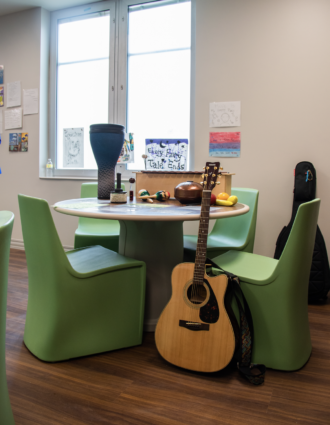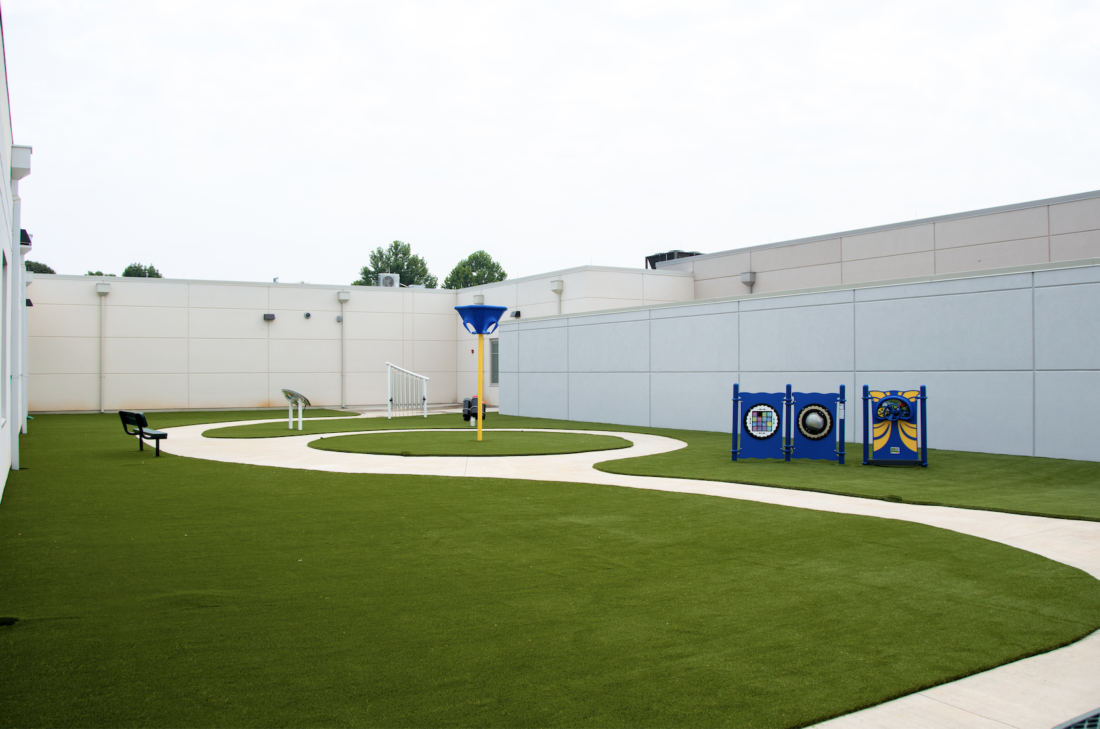When Dr. M. Ed Kelley, the medical director of the new Sweeten Creek Mental Health and Wellness Center, spoke at the new facility’s July 18 dedication, he described mental health care throughout history. Patients with behavioral health needs were essentially warehoused in “asylums,” he said, alluding to overcrowding and lack of therapeutic aid.
In more recent decades, the approach and science behind mental health treatment has progressed. And the center, owned by HCA Healthcare and located in East Asheville, is part of that evolution.
The facility will add 38 beds for mental health care in the community, for a total of 120 beds across several units for children, adolescents, adults and seniors. Additionally, the single-level facility will provide an in-house pharmacy, an electroconvulsive therapy wing and a wing for intensive outpatient treatment for adults.
“Behavioral health is central to health,” said Kody Kinsley, N.C. Department of Health and Human Services secretary, during the July 18 dedication.
Therapeutic spaces
The chief operating officer of Mission Hospital Behavioral Health Services, Melina Arrowood, gave Xpress a tour of the site prior to its opening while the building was under construction. Sweeten Creek has units for low-acuity adults (meaning less intensive care) and high-acuity adults, an acute pediatric unit and an acute adolescent unit. Arrowood explained that people arriving from the hospital have a separate entrance to protect their privacy.
Arrowood told Xpress that designing a calm, safe environment for patients and staff was paramount to the project. For example, doors used by patients have two-way hinges so they can’t be barricaded shut. She pointed out specialty furniture, designed for safety in behavioral health settings, throughout the facility. In the cafeteria, tables and chairs have smooth edges and are either weighted with sand or bolted to the floor to prevent being picked up or thrown. The chairs also don’t have arms, which could be removed and used to cause injury.

Arrowood underscored how adult patients will never intermingle with underage patients in the facility. All units have their own sleeping areas and outdoor spaces. Meals in the cafeteria and recreational activities in the gymnasium will be scheduled at different times for each unit.
The nurses stations on each unit are open-facing and look out onto common areas with seating and televisions. Computers are mounted to the interior desks in the stations, and the height of the countertops is such that an adult cannot reach across to a nurse.
Meanwhile, walls throughout Sweeten Creek are painted in light blues and greens. Numerous murals throughout the facility depict peaceful scenes such as daisies, hot-air balloons, butterflies and a mountain setting.
Among the site’s many other features, there is a playground designed for kids in mental health care settings; the geriatric unit has a walking path; and the adolescent unit has outdoor-safe musical instruments.
‘Look no further than the jail’
At the dedication ceremony for the Sweeten Creek Mental Health and Wellness Center, several attendees also mentioned detention facilities and their role in the mental health care system.
“If you’d like to see the mental health facility in every county, I encourage you to look no further than the jail,” NCDHHS secretary Kinsley told the crowd, as audience members murmured their assent.
Kinsley said that county sheriffs across the state frequently tell him that “we will never arrest our way out of this problem,” meaning crimes that are caused by untreated mental illness and substance use issues that exacerbate such illness.
Kinsley praised the recent Medicaid expansion in North Carolina. He predicted that Medicaid expansion will make preventive mental health care more accessible for more people, so they don’t continue to primarily use emergency rooms for acute mental distress.
Medical clearance from the ER is required for patients before arriving at Sweeten Creek, however, according to medical director Kelley.
Buncombe County Sheriff Quentin Miller echoed the sentiment that jails are not a substitute for mental health care when he spoke to Xpress after the event. He called Sweeten Creek an “opportunity” to care for people beyond holding them in detention facilities. “We are very fortunate to have this building built.”
Miller noted that while law enforcement officers may have some training in crisis management, they aren’t trained in mental health care or addiction medicine. In addition to being first responders, they are also asked to care for people with mental health and substance use issues in detention facilities, which is a challenging dual role.
“It’s so important that we have the opportunity to utilize a facility like this so that we could actually help people,” Miller continued. “What [Kinsley] said is true — we’re not going to be able to arrest our way out of this situation. We all know it, but now we’re doing something about it.”




Before you comment
The comments section is here to provide a platform for civil dialogue on the issues we face together as a local community. Xpress is committed to offering this platform for all voices, but when the tone of the discussion gets nasty or strays off topic, we believe many people choose not to participate. Xpress editors are determined to moderate comments to ensure a constructive interchange is maintained. All comments judged not to be in keeping with the spirit of civil discourse will be removed and repeat violators will be banned. See here for our terms of service. Thank you for being part of this effort to promote respectful discussion.